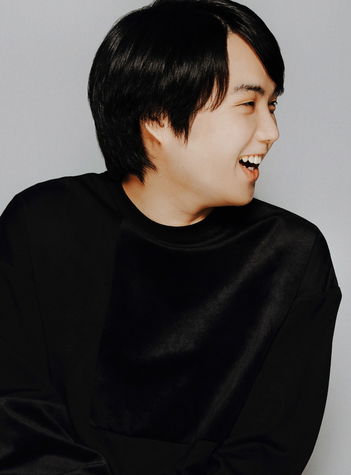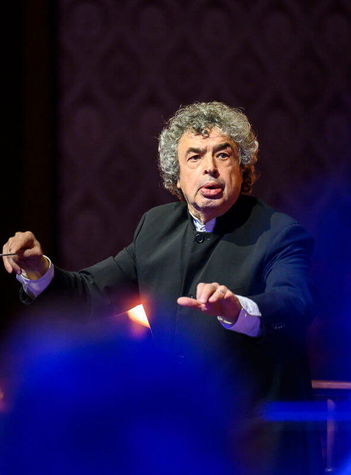Programme
Antonín Dvořák
Carnival Overture, Op. 92
Antonín Dvořák
Piano Concerto in G minor, Op. 33
Antonín Dvořák
Symphony No. 7 in D minor, Op. 70
Secure your seat for the 2025/2026 season – presales are open.
Choose SubscriptionThe Czech Philharmonic will play in Korea’s capital for the first time in six years. The Japanese pianist Mao Fujita will appear in Dvořák’s Piano Concerto, and the highpoint of the programme will be Dvořák’s Seventh Symphony. Leading the whole programme is chief conductor Semyon Bychkov.
Antonín Dvořák
Carnival Overture, Op. 92
Antonín Dvořák
Piano Concerto in G minor, Op. 33
Antonín Dvořák
Symphony No. 7 in D minor, Op. 70
Mao Fujita piano
Semyon Bychkov conductor
Czech Philharmonic

Mao Fujita piano

With an innate musical sensitivity and naturalness to his artistry, 26-year old pianist Mao Fujita has already impressed many leading musicians as one of those special talents which come along only rarely, equally at home in Mozart as the major romantic repertoire.
Born in Tokyo, he began piano lessons at the age of five and won his first international prize in 2010 at the World Classic in Taiwan. While still studying at the Tokyo College of Music in 2017, he took First Prize at the prestigious Concours International de Piano Clara Haskil in Switzerland, which brought him to the attention of the international music community for the first time. He was also the Silver Medalist at the 2019 Tchaikovsky Competition in Moscow.
Fujita has been invited to appear in recital at major international festivals and made US recital debut at Carnegie Hall in January 2023. Recent orchestral highlights include performances with the Gewandhausorchester, Munich Philharmonic, Royal Philharmonic or Royal Concertgebouw. In November 2021, Fujita signed an exclusive multi-album deal with Sony Classical International (Mozart’s complete piano sonatas, 72 Preludes by Chopin, Scriabin, and Yashiro). He is a member of Konzerthaus Dortmund’s series "Junge Wilde" from the 24/25 season.
Semyon Bychkov conductor

In addition to conducting at Prague’s Rudolfinum, Semyon Bychkov and the Czech Philharmonic in the 2023/2024 season, took the all Dvořák programmes to Korea and across Japan with three concerts at Tokyo’s famed Suntory Hall. In spring, an extensive European tour took the programmes to Spain, Austria, Germany, Belgium, and France and, at the end of year 2024, the Year of Czech Music culminated with three concerts at Carnegie Hall in New York.
Among the significant joint achievements of Semyon Bychkov and the Czech Philharmonic is the release of a 7-CD box set devoted to Tchaikovsky’s symphonic repertoire and a series of international residencies. In 2024, Semjon Byčkov with the Czech Philharmonic concentrated on recording Czech music – a CD was released with Bedřich Smetanaʼs My Homeland and Antonín Dvořákʼs last three symphonies and ouvertures.
Bychkovʼs repertoire spans four centuries. His highly anticipated performances are a unique combination of innate musicality and rigorous Russian pedagogy. In addition to guest engagements with the world’s major orchestras and opera houses, Bychkov holds honorary titles with the BBC Symphony Orchestra – with whom he appears annually at the BBC Proms – and the Royal Academy of Music, who awarded him an Honorary Doctorate in July 2022. Bychkov was named “Conductor of the Year” by the International Opera Awards in 2015 and, by Musical America in 2022.
Bychkov began recording in 1986 and released discs with the Berlin Philharmonic, Bavarian Radio, Royal Concertgebouw, Philharmonia Orchestra and London Philharmonic for Philips. Subsequently a series of benchmark recordings with WDR Symphony Orchestra Cologne featured Brahms, Mahler, Rachmaninov, Shostakovich, Strauss, Verdi, Glanert and Höller. Bychkov’s 1993 recording of Tchaikovsky’s Eugene Onegin with the Orchestre de Paris continues to win awards, most recently the Gramophone Collection 2021; Wagner’s Lohengrin was BBC Music Magazine’s Record of the Year (2010); and Schmidt’s Symphony No. 2 with the Vienna Philharmonic was BBC Music Magazine’s Record of the Month (2018).
Semyon Bychkov has one foot firmly in the culture of the East and the other in the West. Born in St Petersburg in 1952, he studied at the Leningrad Conservatory with the legendary Ilya Musin. Denied his prize of conducting the Leningrad Philharmonic, Bychkov emigrated to the United States in 1975 and, has lived in Europe since the mid-1980’s. In 1989, the same year he was named Music Director of the Orchestre de Paris, Bychkov returned to the former Soviet Union as the St Petersburg Philharmonic’s Principal Guest Conductor. He was appointed Chief Conductor of the WDR Symphony Orchestra (1997) and Chief Conductor of Dresden Semperoper (1998).
Antonín Dvořák
Carnival Overture, Op. 92
“Whatever we have in Czech history that is truly great has grown from the bottom up!” This sentence by the famous Czech author Jan Neruda tells us a great deal about the history of the Czech nation and its great figures. It certainly applies unreservedly to Antonín Dvořák, whose growing artistry took him from a little village to the world’s greatest metropolises.
When Neruda wrote these words in 1884, he was 50 years old. And what was Antonín Dvořák doing in 1891 at age 50? He was a famous, sought-after composer, an artist whose popularity had long since crossed the borders of Austria-Hungary and spread all over Europe. It was in the year of his 50th birthday that he was offered the directorship of the National Conservatory of Music in New York. He considered the matter very carefully, consulting with many of the people who were close to him. For example, he wrote to his friend Alois Göbl in June 1891: “I’m supposed to go to America for two years! […] Should I accept the offer? Or not? Send me word.” Dvořák had never been very fond of celebrations, so it is no surprise that in early September he refused to take part in celebrations in Prague for his 50th birthday because he was spending time with his family at his beloved summer home in Vysoká, where he went to rest and to compose. Four days after his birthday (12 September 1891), he finished orchestrating Carnival Overture, Op. 92, the second work in a cycle of three concert overtures that are programmatic in character. We do not have a concrete programme from the composer, but he clearly realised something here that no one would have expected from him in the realm of symphonic music. Two years earlier, he had already gone down this path in chamber music with his Poetic Tone Pictures, Op. 85, thirteen pieces for solo piano, about which he jokingly commented: “I’m not just an absolute musician, but also a poet.” Dvořák had originally conceived his triptych of concert overtures depicting three aspects of human life as a single whole with the title “Nature, Life, and Love”. All three overtures are also carefully motivically interconnected. Ultimately, however, the composer told his publisher Simrock that his overtures “each can also be played separately”, and he gave them the opus numbers and titles In Nature’s Realm, Op. 91, Carnival Overture, Op. 92, and Othello, Op. 93. The first performance of all three overtures took place on 28 April 1892 at the Rudolfinum in Prague at the composer’s farewell concert before his departure for America, with Dvořák himself conducting the orchestra of the National Theatre. Dvořák also conducted their second performance, this time across the ocean on 21 October 1892 at New York’s Carnegie Hall.
Antonín Dvořák
Piano Concerto in G minor, Op. 33, B63
Dvořák was already a composer of genius by 1876, when he wrote his Piano Concerto in G minor, Op. 33, but he was basically known only to the Prague public. At the time, he had to earn a very modest living as an organist and by giving piano lessons privately. In those days, the pianist Karel Slavkovský was devoting considerable attention to music by Czech composers. On 24 March 1878, it was he who played was the first to play the solo part of Dvořák’s new work in the hall at Prague’s Žofín Palace. A second performance, again in Prague and with the same pianists, took place two years later. At that time, shortly after the extraordinary success of Dvořák’s Moravian Duets and of the Slavonic Dances in Germany, he was receiving offers from important publishers. One of them, Julius Hainauer from Breslau, published the concerto in 1883. Before publication, Dvořák made major revisions to the score, giving the work its ideally polished sound. His concerto was ahead of its time in many ways, and that had negative consequences. Some music critics (although a small minority) saw the work’s departures from the usual as weaknesses, while others were blinded by their aversion to Czech patriotism, an entirely irrelevant objection in the case of Dvořák. Despite such voices, the composer maintained a very detached perspective. After an otherwise successful concert in Berlin in 1884, Dvořák wrote to the piano virtuoso Anna Grosser: “All this criticism overflowing with ridicule, hatred, and bile (more like an execution) provides me with plenty of amusement and entertainment. Things keep getting crazier, but those gentlemen in Berlin still will not stop me from taking flight!”
The critics did not keep the composer from taking flight, but his Piano Concerto remained grounded to some extent. The concerto continued to be played over the following years, but notably less often than other great works by Dvořák. An important chapter in the performance history of the concerto in the 20th century belongs to an arrangement of the solo part made by the Prague piano virtuoso and teacher Vilém Kurz 15 years after Dvořák’s death. Several of his pupils and other pianists played the concerto in that form even long after such arrangements had ceased to be fashionable, when, to the contrary, there were increasing efforts towards the most faithful possible interpretations of composers’ intentions. The soloist for today’s concert, András Schiff, has clear reasons for playing Dvořák’s own version. More and more pianists have begun doing so in recent decades, but the work is still performed less often overall than other concertos. The key to an explanation may be the words of the phenomenal pianist Sviatoslav Richter, who only played Dvořák’s own version. Richter certainly did not suffer from technical limitations, but he always “merely” had to get to the heart of a work and understand it. In November 1977, he wrote in his diary: “I recall how long it took me to learn this [Dvořák’s] concerto (nearly three years), while I learned Bartók’s Second Piano Concerto in just two months without having any special difficulties.” This may be another reason why it is hard to find another work like Dvořák’s Piano Concerto: brilliant yet seldom heard.
The Czech Philharmonic will play in Korea’s capital for the first time in six years. The Japanese pianist Mao Fujita will appear in Dvořák’s Piano Concerto, and the highpoint of the programme will be Dvořák’s Seventh Symphony. Leading the whole programme is chief conductor Semyon Bychkov.